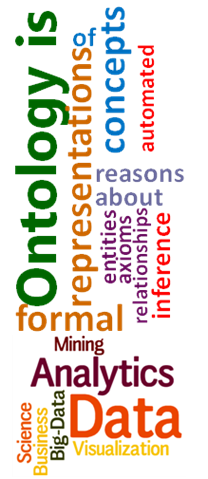The classic definition of a computational ontology is that it is “an explicit specification of a conceptualization.” For us, a “conceptualization” is the set of ontologies required to ensure common interpretation of data from one or more shared databases. Ontologies can be informal or light-weight (e.g. North American Industry Classification System [NAICS]); formal, like the TOVE Ontologies that are represented in first-order logic; or be somewhere in between (i.e. semi-formal like medical ontologies that classify and relate medical terms).
We are investigating research questions that have real-life management and entrepreneurial applications of ontologies, in particular for: blockchain design, data analytics, and enterprise modeling.
Ontology-Driven Blockchain Design. A blockchain is a distributed database that maintains a continuously-growing list of data records secured from tampering and revision. This cryptographic technology offers a way for people who do not know or trust each other to create a record of who owns what that will compel the assent of everyone concerned. Originally developed to underpin the bitcoin cryptocurrency network, the blockchain has many enthusiastic supporters who see its potential beyond cash and currency. The potential for blockchain to enable a distributed ledger of digital assets is the source of their enthusiasm.
In order to understand data in a database distributed across numerous organizations, there must be common interpretation of data across these organizations. This interpretation can be informally enforced via use of common data standards—i.e. models, dictionaries, and conventions—and via business practices and processes that support adoption of data standards by human developers working at these organizations. We believe that light-weight and semi-formal ontologies could be used for this. We are interested in how such ontologies could be helpful in developing blockchain designs. Interpretation can also be formally enforced via formal specifications that enable automated inference and verification within software applications that execute on a network that spans these organizations. We believe that formal ontologies could be used for this. We are interested in how formal ontologies can be translated to smart contracts, the distinct pieces of code that enable automated blockchain-based business process and workflow execution. Our research teams are interested in pursuing these beliefs. Here is our position paper that provides more detail.
Ontology-Driven Data Analytics. We posit that a research/management/entrepreneurial opportunity exists because, often, even if a knowledge worker has data to make good decisions, they lack the proper theory about how to process or interpret that data. Yet, even if an appropriate theory exists, it is often oblivious or opaque to the worker. We posit that computational ontologies can be used to bridge this gap. We adopt the perspective that ontologies are formal representations of a theory. Computationally, an ontology is a set of if-then rules that can be applied to data. If, for example, an accounting firm maintains historical data about their staff and clients, they can apply relevant ontologies to their databases to best match audit teams to clients. There is an accounting theory that theorizes that letting client-focused auditors apply rule-based standards can lead to overly aggressive financial reporting. Ontologies of such theories can be incorporated into an accounting firm’s risk management system to prevent an Enron-like fiasco. Our research teams are working to make this kind of ontology-driven analytics possible. Here is our position paper that provides more detail.
Ontology-Based Enterprise Modeling. In this perspective, we view activities, states, resources, and organizational structures and constraints as the fundamental building blocks of the enterprise. That is, we describe an enterprise in terms of these constructs and then additionally, formally specify rules or axioms about them (e.g. if an activity consumes a quantity of a resource A, then some quantity of another resource B must be produced, and moreover there must be less of A after the activity completes). The definition of these constructs as “objects” and the specification of these axioms in a formal language like first-order logic comprise an ontology. In ontology-based enterprise modeling, objects and axioms in more fundamental ontologies like ontologies of activities and resources serve as building blocks to represent more abstract enterprise concepts like quality and cost management. Our primary focus has been on enabling enterprise models to represent and reason about quality by developing ontologies of measurement, traceability, and quality management systems and using this ontology-based system to automatically infer about enterprise quality like evaluating ISO 9000 compliance. Our research teams are working to further enhance our research on qntologies for quality management, especially in the current technological context. The Internet of Things provides new opportunities to measure the state of an enterprise at a very granular level, and we believe that ontology-based enterprise models can be used to make powerful inferences to support fine-grained, evidence-based decision-making. Here is a paper that details ontologies for quality management.

